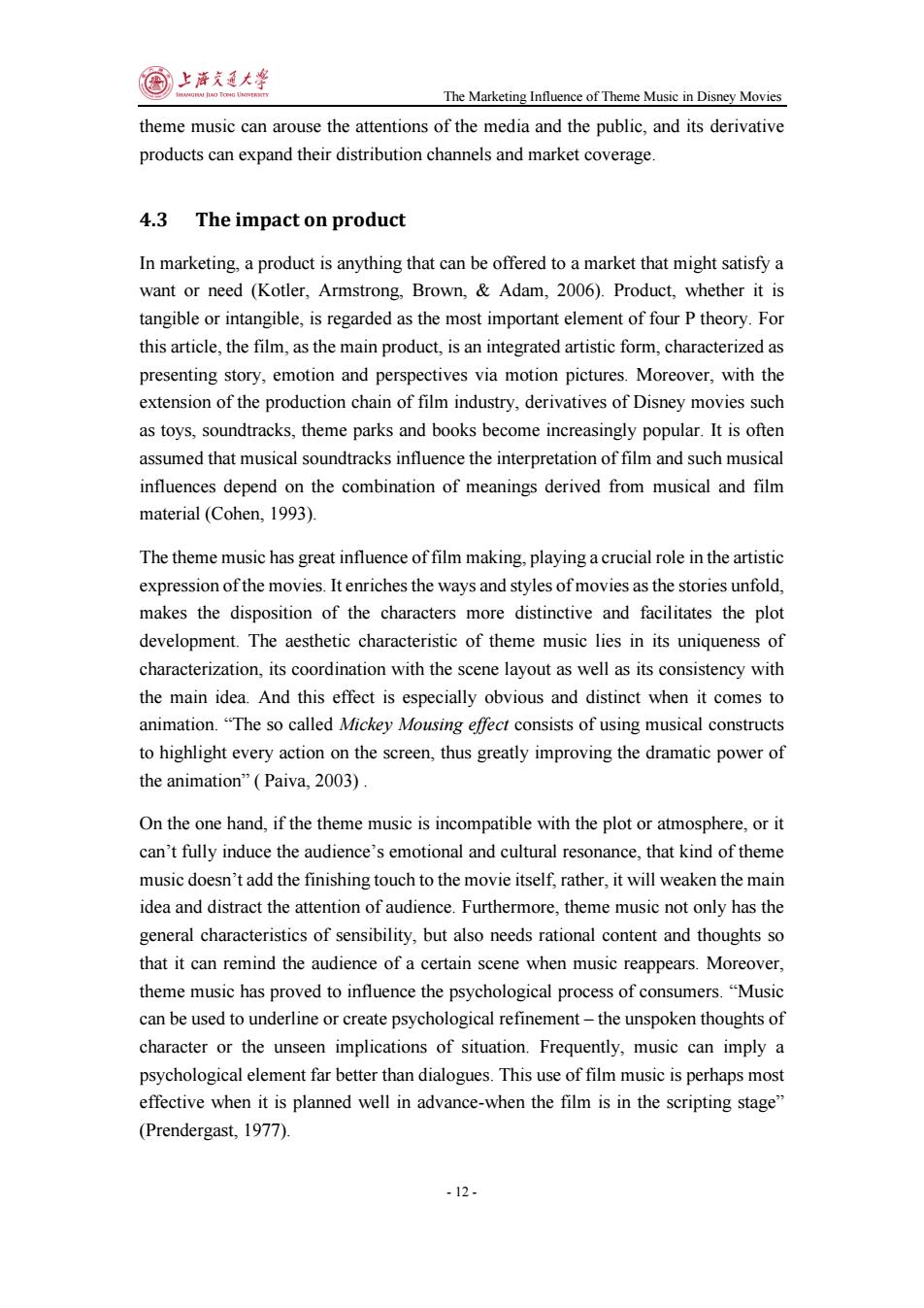正在加载图片...

国上济文道大¥ The Marketing Influence of Theme Music in Disney Movies theme music can arouse the attentions of the media and the public,and its derivative products can expand their distribution channels and market coverage 4.3 The impact on product In marketing,a product is anything that can be offered to a market that might satisfy a want or need (Kotler,Armstrong,Brown,Adam,2006).Product,whether it is tangible or intangible,is regarded as the most important element of four P theory.For this article,the film,as the main product,is an integrated artistic form,characterized as presenting story,emotion and perspectives via motion pictures.Moreover,with the extension of the production chain of film industry,derivatives of Disney movies such as toys,soundtracks,theme parks and books become increasingly popular.It is often assumed that musical soundtracks influence the interpretation of film and such musical influences depend on the combination of meanings derived from musical and film material (Cohen,1993). The theme music has great influence of film making,playing a crucial role in the artistic expression of the movies.It enriches the ways and styles of movies as the stories unfold, makes the disposition of the characters more distinctive and facilitates the plot development.The aesthetic characteristic of theme music lies in its uniqueness of characterization,its coordination with the scene layout as well as its consistency with the main idea.And this effect is especially obvious and distinct when it comes to animation."The so called Mickey Mousing effect consists of using musical constructs to highlight every action on the screen,thus greatly improving the dramatic power of the animation"(Paiva,2003). On the one hand,if the theme music is incompatible with the plot or atmosphere,or it can't fully induce the audience's emotional and cultural resonance,that kind of theme music doesn't add the finishing touch to the movie itself,rather,it will weaken the main idea and distract the attention of audience.Furthermore,theme music not only has the general characteristics of sensibility,but also needs rational content and thoughts so that it can remind the audience of a certain scene when music reappears.Moreover, theme music has proved to influence the psychological process of consumers."Music can be used to underline or create psychological refinement-the unspoken thoughts of character or the unseen implications of situation.Frequently,music can imply a psychological element far better than dialogues.This use of film music is perhaps most effective when it is planned well in advance-when the film is in the scripting stage" (Prendergast,1977). -12-The Marketing Influence of Theme Music in Disney Movies - 12 - theme music can arouse the attentions of the media and the public, and its derivative products can expand their distribution channels and market coverage. 4.3 The impact on product In marketing, a product is anything that can be offered to a market that might satisfy a want or need (Kotler, Armstrong, Brown, & Adam, 2006). Product, whether it is tangible or intangible, is regarded as the most important element of four P theory. For this article, the film, as the main product, is an integrated artistic form, characterized as presenting story, emotion and perspectives via motion pictures. Moreover, with the extension of the production chain of film industry, derivatives of Disney movies such as toys, soundtracks, theme parks and books become increasingly popular. It is often assumed that musical soundtracks influence the interpretation of film and such musical influences depend on the combination of meanings derived from musical and film material (Cohen, 1993). The theme music has great influence of film making, playing a crucial role in the artistic expression of the movies. It enriches the ways and styles of movies as the stories unfold, makes the disposition of the characters more distinctive and facilitates the plot development. The aesthetic characteristic of theme music lies in its uniqueness of characterization, its coordination with the scene layout as well as its consistency with the main idea. And this effect is especially obvious and distinct when it comes to animation. “The so called Mickey Mousing effect consists of using musical constructs to highlight every action on the screen, thus greatly improving the dramatic power of the animation” ( Paiva, 2003) . On the one hand, if the theme music is incompatible with the plot or atmosphere, or it can’t fully induce the audience’s emotional and cultural resonance, that kind of theme music doesn’t add the finishing touch to the movie itself, rather, it will weaken the main idea and distract the attention of audience. Furthermore, theme music not only has the general characteristics of sensibility, but also needs rational content and thoughts so that it can remind the audience of a certain scene when music reappears. Moreover, theme music has proved to influence the psychological process of consumers. “Music can be used to underline or create psychological refinement – the unspoken thoughts of character or the unseen implications of situation. Frequently, music can imply a psychological element far better than dialogues. This use of film music is perhaps most effective when it is planned well in advance-when the film is in the scripting stage” (Prendergast, 1977)